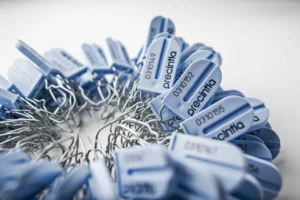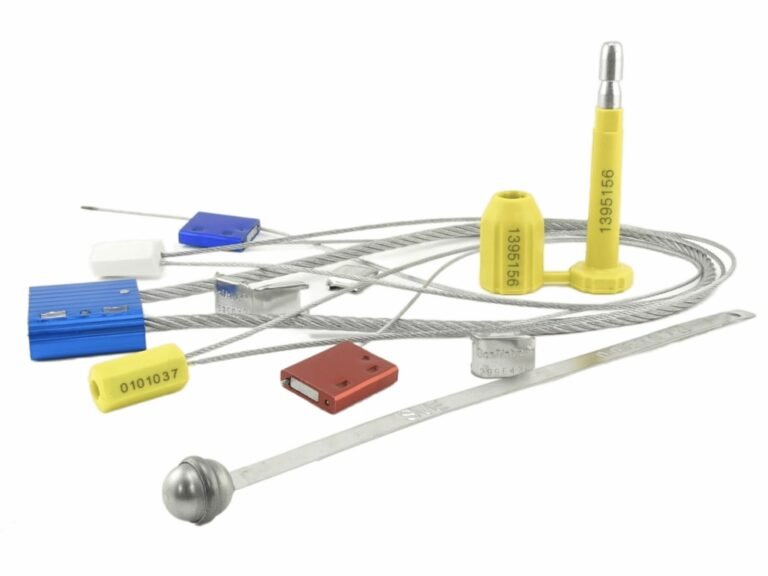Your team cuts off hundreds of plastic seals from an incoming shipment. They pile up in a bin, destined for the general waste, an afterthought in a busy warehouse. This seemingly minor act, repeated daily, creates a significant plastic waste stream, undermining your company's ESG goals and creating a compliance risk you can no longer afford to ignore.
The responsible disposal of used security seals requires a strategic hierarchy: prioritize recycling through certified industrial processors, engage in manufacturer take-back programs, and repurpose seals for non-security roles. Landfilling should only be the last resort when all other avenues are exhausted.

I've spent years designing security logistics programs, and this question of disposal has shifted from a footnote to a headline issue. It's no longer just an operational task; it's a strategic decision that impacts brand reputation and regulatory standing. The framework I now use with my clients is built on hard lessons learned from initial failures.
Why Can’t You Just Use Standard Municipal Recycling?
It’s plastic, so it goes in the blue bin, right? This is the most common mistake I see, and it often does more harm than good by contaminating entire batches of recyclable materials, resulting in everything being sent to landfill.
Most municipal recycling facilities are designed to process consumer packaging like PET bottles and HDPE jugs. Security seals, made from industrial-grade Polypropylene (PP) or High-Density Polyethylene (HDPE), are too small, dense, and often lack the necessary Resin Identification Codes for automated sorting machinery to handle them correctly.

Dive Deeper: The Contamination Failure I Witnessed First-Hand
I once consulted for a major distributor that was, on paper, a model of sustainability. They collected all their used plastic seals and sent them to their local recycling facility. Six months into the program, they were hit with a significant fine from their waste management contractor for persistent contamination.
The root cause was a detail they had overlooked: their high-security seals contained a small metal locking component embedded within the plastic body. For a recycling facility, this mixed material is a nightmare. It can damage expensive sorting equipment and ruin the purity of the resulting plastic pellets. Their well-intentioned program was actually costing the recycling plant money, leading to the rejection of their entire waste stream. This taught me a critical rule: industrial waste requires an industrial solution. You cannot apply consumer-grade recycling logic to specialized B2B products.
How Do You Find a Viable Recycling Partner?
If local recycling is not the answer, what is? The most responsible and scalable solution is to establish a direct partnership with a certified recycler that specializes in post-industrial plastics.
These organizations are equipped to handle the specific challenges that security seals present. They possess the technology to shred, sort by polymer type (even without codes), and remove contaminants like metal components. They turn this waste back into high-quality raw material, contributing to a circular economy.

Dive Deeper: Building the Business Case for Specialized Recycling
The immediate pushback I get from procurement managers is about cost. Specialized recycling is more expensive than landfilling. To get executive buy-in, you have to build a business case that goes beyond waste disposal fees.
Here is the framework I use:
- Conduct a Waste Audit: First, we quantify the problem. For one client, a simple one-month audit revealed they were generating over 2.5 tons of plastic seal waste annually. This tangible number gets attention.
- Identify Certified Partners: We then identify specialists who can process this material. Companies like TerraCycle offer programs for hard-to-recycle items, and others focus specifically on industrial polymers.
- Calculate the True ROI: The return on investment is not in cost savings on landfill fees. The real value lies elsewhere:
- ESG Reporting: The ability to provide auditors with documented proof of recycled tonnage is invaluable for corporate ESG reports, which directly impacts investor confidence.
- Brand Equity: Demonstrating a real commitment to sustainability is now a competitive advantage. This aligns with global initiatives like the Global Plastics Treaty and resonates with your own B2B customers.
- Risk Mitigation: Proactively managing plastic waste avoids potential future fines and taxes as regulations tighten.
By presenting it as a strategic investment in compliance and brand value, the operational cost becomes justifiable.
Are Manufacturer Take-Back Programs a Reliable Option?LL
What if your volumes don't justify a direct contract with a large recycler? The next logical step is to place the responsibility back on the producer of the product.
A manufacturer-led take-back program is a form of Extended Producer Responsibility (EPR), where the company that creates the product manages its end-of-life. This is often the most efficient model, as the manufacturer perfectly understands the material composition of their seals and can recycle them in a true closed loop.

Dive Deeper: My Vetting Checklist for Supplier Programs
Many suppliers will claim to have a recycling program, but I’ve found that many of these are little more than "greenwashing." To separate the real programs from the empty promises, I use a strict vetting checklist when evaluating a new seal provider for a client.
- Logistical Clarity: "Can you provide a detailed Standard Operating Procedure (SOP) for the take-back process? Who provides collection containers, and who is responsible for the freight costs?" A vague answer is a red flag.
- Proof of Process: "What happens to the seals once returned? Can you provide certification from your recycling partner or evidence of them being reused in new products?" A truly circular program can prove its claims.
- Data and Reporting: "Will you provide us with an annual report detailing the total weight of seals we've returned and confirming they were recycled? We require this for our ESG audit trail."
- Scalability: "Is your program equipped to handle our projected annual volume of [e.g., 500,000] seals? Or is this a limited pilot?"
A supplier who can provide clear, documented answers to these questions is a genuine partner in sustainability.
Can You Repurpose Seals Internally?
What should you do with seals that were misprinted, damaged in shipping, or are from an obsolete batch? While they have zero security value, they don't need to be immediately discarded.
A tactical, small-scale solution is to repurpose these seals for non-security tasks within your own operations. This approach reduces immediate waste and fosters a culture of resourcefulness, extracting the maximum utility from the plastic before it enters the disposal stream.

Dive Deeper: The Critical Rule of "Security Decontamination"
The biggest risk of repurposing is operational confusion. An employee could accidentally use a visually identical but non-secure, repurposed seal on a live, high-value shipment. This is a catastrophic security failure.
To prevent this, I enforce a strict "decontamination" protocol for any client implementing an in-house repurposing program:
- Visual Differentiation: Use color-coding. For example, all active, secure shipments use blue seals only. Obsolete red or yellow seals can be repurposed.
- Physical Invalidation: The serial number on any repurposed seal must be permanently obliterated. A simple line with a heavy-duty permanent marker is good; drilling a small hole through the number is even better.
- Segregated Storage: Repurposed seals must be stored in a clearly labeled, separate bin far from the active security seal station.
- Defined Use-Cases: Provide a visual chart of approved uses:
OK:Tagging empty pallets for location tracking.OK:Color-coding tools in the maintenance shop.NOT OK:Securing any container, box, or door, even for internal transit.
How Does Team Training Impact Your Disposal Program?
You can design the perfect disposal system, but it will fail if the people on the warehouse floor don't execute it correctly. A single employee tossing a contaminated seal into the wrong bin can jeopardize an entire batch, wasting everyone's effort.
Effective team training is the critical link that turns a sustainability policy into a reality. It ensures correct sorting, minimizes contamination, and empowers employees to become active participants in the company's ESG mission, rather than just passive observers of a new rule.

Dive Deeper: The System That Failed Because of a Missing Poster
I once worked with a company that invested over $20,000 in a state-of-the-art industrial sorting and collection system. A month after launch, I found their collection bins were hopelessly contaminated with coffee cups, food wrappers, and mixed-material seals. The expensive program had completely failed.
The reason? The implementation plan focused 100% on the equipment and 0% on the people. Management sent one email and expected everyone to follow the new rules. My current approach is different. I now implement a simple framework I call "VTS":
- Visualize: Don't just tell; show. We create large, graphical posters with photos of the exact seals they handle. Each poster for each bin shows what does and does not go inside. This follows the principles of visual management found in Lean manufacturing, which makes the correct action the most intuitive one.
- Train: We hold mandatory 15-minute stand-up meetings right on the warehouse floor, next to the new bins. We demonstrate the sorting process, explain why contamination is a problem (it costs the company money and can cause fines), and answer questions.
- Sustain: We appoint a "sustainability champion" for each shift. Their job is not to police but to be a resource for questions. We also tie the program's success (e.g., meeting a 95% purity rate) to small team-based rewards, like a free lunch.
This people-centric approach turns a chore into a shared responsibility and is the only way to guarantee long-term success.
Are Reusable Seals the Ultimate Solution?
Perhaps the most impactful long-term strategy is to fundamentally reduce the consumption of single-use plastic seals. This is where the industry is heading with reusable electronic and mechanical seals.
These devices are designed for hundreds or even thousands of uses. For high-frequency, closed-loop routes—such as a daily shuttle between a factory and a distribution center—the business case is compelling. The initial cost is higher, but the ROI comes from eliminating the recurring cost of single-use seals and drastically reducing plastic waste. A single reusable seal can prevent thousands of individual plastic pieces from ever entering the waste stream, a data point that is extremely powerful in any sustainability report.
Conclusion
Responsible disposal of used security seals has evolved from a simple janitorial task into a strategic imperative for any modern logistics operation, directly impacting compliance, brand, and efficiency.
How ProtegoSeal Can Fit Into Your Sustainability Strategy
Building a truly sustainable seal program requires a partner who thinks beyond the point of sale. The frameworks I've shared are built from real-world projects and are designed to help you create a system that is both secure and environmentally responsible.
At ProtegoSeal, we see end-of-life management as an integral part of our product responsibility. We not only engineer our seals using high-quality, recyclable polymers but also work directly with our clients to establish effective disposal and recycling strategies. If you’re ready to build a seal program that aligns with your security needs and your ESG commitments, contact us to discuss a holistic solution.

